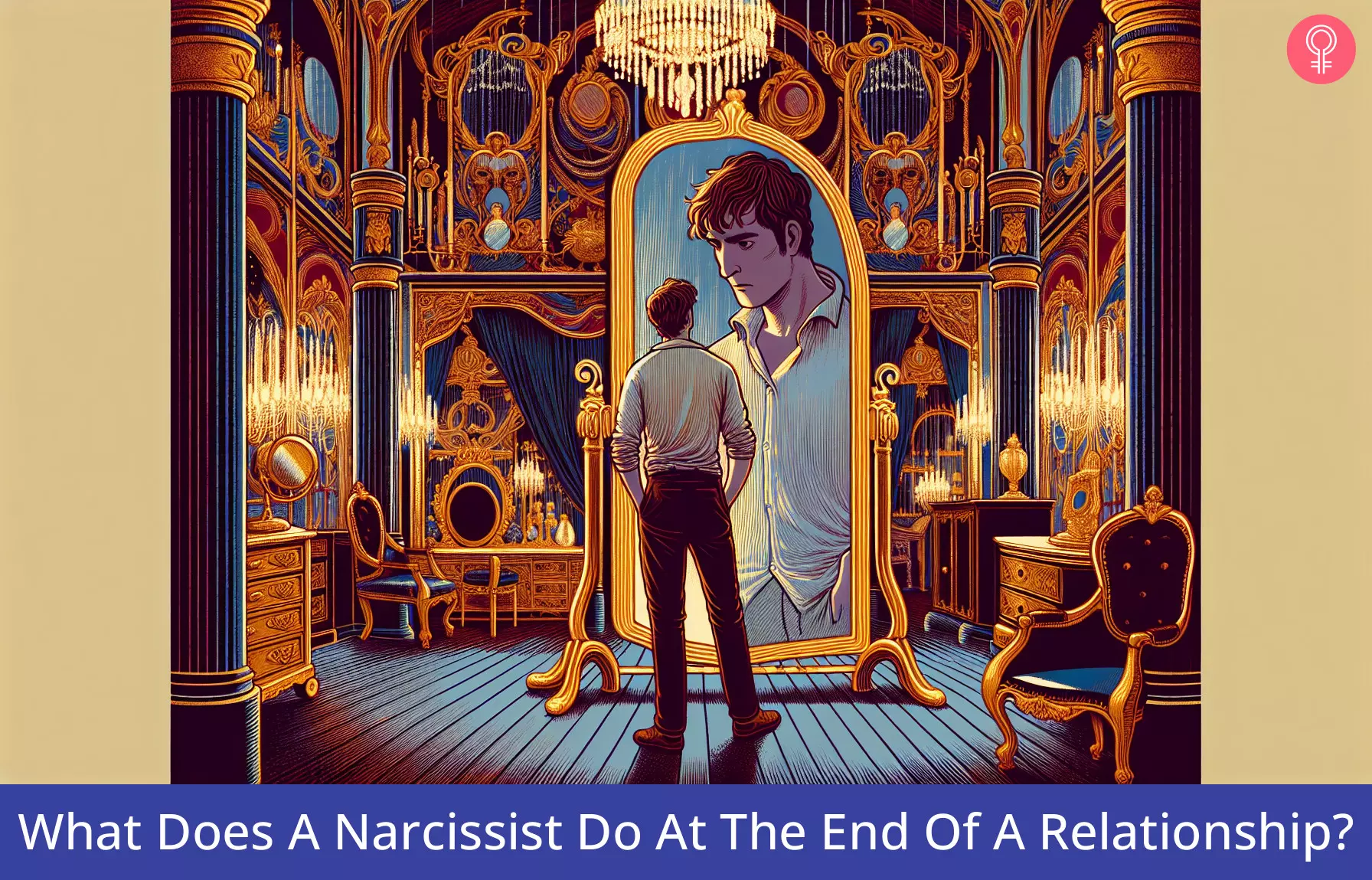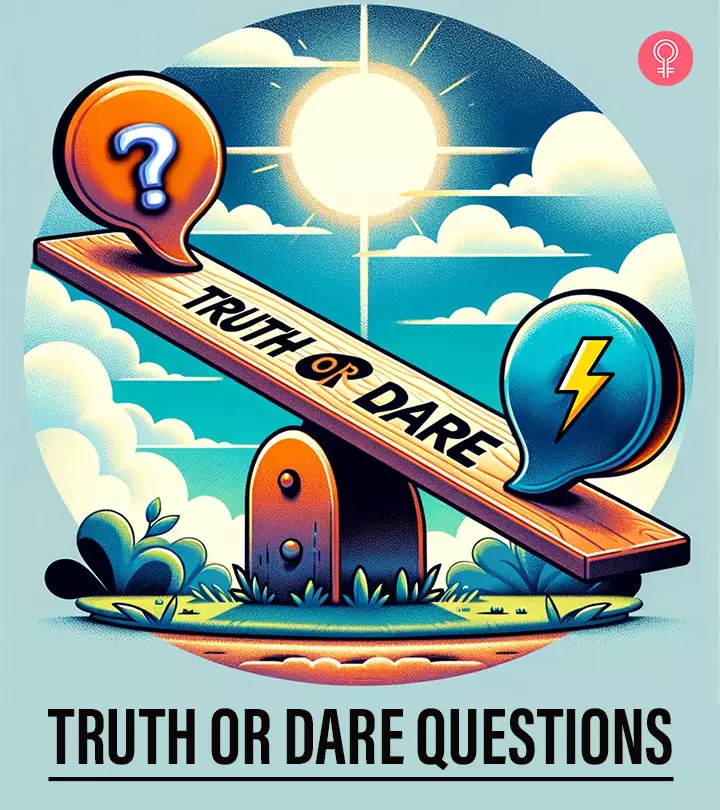What Does A Narcissist Do At The End Of A Relationship?
If you constantly feel exploited by your unempathetic partner, it may be time to end things.

Image: Shutterstock
Getting out of a relationship with someone who has a narcissistic personality is not only challenging but can also get dangerous. They are known to be highly manipulative, conceited, and abusive. However, it is important to understand the psyche of a person with narcissistic personality disorder before you end the relationship. Understanding codependency dynamics is crucial. Their partners are usually isolated from friends and families and lied to constantly – creating a sense of self-doubt and codependency (a dysfunctional relationship dynamic where one partner may rely on the other for validation or sacrifice their own needs and well-being for the other partner). Being aware of this can help you navigate the situation with clarity and understanding. It may be difficult to leave the person despite the abuse. Even after a breakup, the narcissist may hover, harass, or try to taint your reputation. In this article, we discuss how to prepare yourself for ending a relationship with a narcissist. Keep reading.
In This Article
What Is Narcissistic Personality Disorder?
Narcissistic personality disorder is a mental condition where an individual exhibits the following characteristics (1):
- Extremely high sense of self-importance (1)
- Continuous preoccupation with themselves (1)
- Lack of empathy for anyone else (1)
- Exploitative nature of taking advantage of others to achieve their own goals (2)
- A notion that others are jealous of them (2)
- Haughtiness and a vain attitude (2)
It is a complex personality disorder that reveals a consistent pattern of grandiosity. An individual with this mental condition feels the need for special treatment and admiration at all times (2).
 Trivia
TriviaAre you wondering what may happen if you enter a relationship with a narcissist? Read to know more.
Key Takeaways
- A partner with a narcissistic personality disorder does not show empathy, is preoccupied with themselves, is arrogant, is self-admiring, and thinks that others are jealous of them.
- Initially, narcissistic partners will show utmost love and care, but they will start blaming you for everything and gaslight you.
- After a breakup, narcissistic partners try to convince you that you are making a mistake, they make fake promises about fixing the relationship, and they send you on a guilt trip.
What Happens In Relationships With Narcissists

A relationship involving a narcissist typically goes through three phases:
- Initial Phase

The narcissist exhibits a charismatic and charming personality. They are totally in love with you and make you feel special. They flood you with compliments and pamper you with gifts. They let you and the rest of the world know how special you are to them.
 Quick Tip
Quick Tip- Devalue Phase

The narcissist exhibits a complete shift in their behavior. They criticize and gaslight (a psychological manipulation tactic or abuse to make someone doubt their own sanity) you. A narcissist might always try to find fault in you. Previously they might have praised you for your fashion sense. Now they might say something like, ‘Why do you look so shabby all the time? You never take time to look good or groom yourself.’ They may manipulate you to doubt your reality. There is no warmth, affection, or intimacy. You begin to question your own behavior and wonder if you deserve all the bad treatment.
- Discard Phase

This is the final stage of the relationship. The narcissist makes it clear through their words and deeds that they have no further use for you.They behave as if they were never in love with you. They may exhibit this by acting distant, cold, or by not providing emotional support. For instance, if your brother is at hospital in a serious condition, they might not offer you comfort, show empathy or concern. Instead, they might just say things like, ‘I don’t have time to visit the hospital.’ This is true as an egotistical narcissist does not feel the emotion of love for their partner. They only know to love themselves.
What happens after these three phases? What does a narcissist do at the end of a relationship? The next section has the answers.
What Does A Narcissist Do When A Relationship Ends?
Ending a relationship with a narcissist is never easy. Trying to break up with them can only make them more rigid and manipulative. But irrespective of who decides to break up, you can expect the following behavioral traits from a narcissist:
- They Shift The Blame
They hold you responsible for the relationship to end. They place the entire blame on you. They may even label you as selfish and demanding, and consider you as someone who had ruined the relationship single-handedly. They might blame you for their wrongdoings. For instance, they might just say, ‘If you hadn’t done it or spoken in that manner, then I too wouldn’t have acted the way I did.’ This way, they refuse to take accountability for their actions, and it can make you feel guilty about ending the relationship. Playing the victim is a form of manipulation for them. They avoid taking any responsibility or accountability for any of their wrongdoing. Playing the victim is an emotional manipulation tactic that narcissists often employ to get what they want.
- They Insist You Are Committing A Mistake

Having devalued you for long, they are prone to telling you that it is all your fault. If you are the one walking out of the relationship, they try to convince you that you are committing a mistake. They may try to change your decision by saying something like, ‘You are committing the biggest mistake of your life.’ Alternatively, they might also try to manipulate you by playing the emotional card by saying, ‘I have sacrificed a lot for this relationship and are also well aware of it. If you still think it’s okay to leave something beautiful that we have built with a lot of care, effort, or love then do it the way you like it. It will never be the same without you.’ Remember, it’s important to empower yourself to make decisions that are best for you because Breaking up with a narcissist can be mentally exhausting as they know all your weaknesses and trigger words and will use them to their advantage when they realize their control over you is slipping away. They want to make you feel bad for your decision and perhaps even regretful, making you re-think it.
- They Try To Guilt-Trip You To Stay Back
A narcissist can go to great lengths to hold you back in a relationship. They may use guilt as a tool to break your resolve to leave. For instance, they might just say, ‘I have been there for you when nobody was. Do you remember how painstakingly I helped you overcome that depressive state and changed your outlook about your life? This is how you repay?’ They may remind you of all that they have done for you owing to their self-regarding nature and accuse you of being ungrateful and self-centered.
- They Seek Attention Even After Breaking Up
A narcissistic partner would feel rejected when you break up with them. This can trigger them to seek more attention. They may demand attention from you even after the relationship has ended. For instance, even after a breakup, they might call or text you and expect you to answer them. This way, they can try to make you feel guilty and hope that you will give them attention.
- They Promise To Make Things Right
They can go as far as promising to change themselves for you in an attempt to keep you in the relationship. They will tell you that they have realized their mistakes and are ready to make changes if you give them just another chance. In an attempt, they might make false promises like,’ I am working on anger management; I have already attended two sessions with the therapist. I am trying to be more calm and control my aggression.’ This way, narcissists may give them another chance based on their present progression to get better.
- They Use Social Media To Spread Misinformation
When a narcissist realizes that you have finally walked out of the relationship, they may take to social media platforms to spread gossip and misinformation about you. They might twist the truth and spread their version of the story to mutual friends and family. They might say, ‘She/he has left me struggling and doesn’t care about my feelings’ or ‘I did everything to make him/her happy, but it was never enough.’ This is an attempt to make you the villain in their story. Protecting your narrative is key to maintaining your sense of control and security.
- They Expect You To Fulfill Their Needs
They refuse to accept the change even after you have walked out of the relationship. They still expect you to address their random needs. For instance, they may ask you to make an appointment with the dentist on their behalf or request you to continue handling the accounting work that you used to do for them.
Now that you know how narcissists end relationships, it is time to focus on their break-up styles. Explore the details in the next section.
While the narcissist variously lashes out at the end, there are things you can do to deal with the fallout. Learn about them below.
How to Deal With A Narcissist At The End Of A Relationship?
A narcissist at the end of a relationship often exhibits heightened manipulative and self-centered narcissistic relationship behaviors. Below are a few pointers to cope adequately:
- Establish clear boundaries and stay firm in your decisions.
- Engage in self-care practices and activities that bring you joy.
- If the end of the relationship includes complications like child custody or property disputes, seek legal advice.
- If you decide to communicate with the narcissist, keep records of important interactions and communications. This may come in handy in case any legal issues arise.
- Reach out to a therapist for support, as dealing with a narcissist can be emotionally and mentally draining.
Different narcissists have different break-up styles and how they deal with the ultimatum. Check the section below to learn more.
Break-up Styles: Vulnerable Narcissists Vs. Grandiose Narcissists
A grandiose narcissist is someone who fosters and exhibits overt feelings of superiority. Such people carry a big ego and limitless self-esteem. On the other hand, a vulnerable narcissist is much more introverted. They are contemplative, self-absorbed, anxious, and reflect hypersensitivity (3).
A vulnerable narcissist will prefer you breaking up with them. They avoid being in confrontations and are used to feeling self-pity.
However, grandiose narcissists are self-obsessed and love being the center of all attention. They will be ready to fight it out with you. They may even start looking for a new partner in front of you.
If you know which type of narcissist you are involved with, you can get an idea about how the breakup may turn out to be.
How Can You Tell If The Relationship Is Over?

A narcissist is likely to come back to you even after the relationship is over. They will continue to try making up without considering how they make you feel. They will try to get you back in their life to boost their ego and self-esteem. But be sure not to give in, and don’t be fooled by how they approach you. Nothing has changed, and nothing will be different; this is for their own selfish desires.
If you do not pay much attention to the whole matter, they will continue with this behavior until they find a new partner. Then they will abruptly detach from you.
If you have broken up with them, know that it is the end. It is not a good idea to indulge a narcissist after breaking up. Try to stay away from them and resist all attempts of communication, such as phone calls, messages, emails, and in-person meetings.
Are you wondering if a narcissist will end up alone? Read on to know the answer.
Do Narcissists End Up Alone?
There is no denying that narcissists mistreat their partners. As a result, they usually end up alone. Although they can easily make friends and attract new partners, the same cycle continues, and after a while, they are back to square one.
Narcissists are self-loving and have unstable interpersonal relationships (4). Even though their partners and friends shower them with attention and empathy, they are incapable of reciprocating. As such, they often end up alone.
If you are in a relationship with a narcissist, you must be interested to know how to steer clear of a painful breakup. Read the next section.
Avoiding A Painful Breakup With A Narcissist
It is never a good feeling when a narcissist walks out of a relationship. They can break up so abruptly that you may be left behind wondering why things had moved to the point of no return. Rather than drowning yourself in self-pity, you need to take proper action.
When you are dealing with a breakup that involves a narcissist, avoid hurting their ego. Also, ensure not to respond to any communication from them after the breakup. No contact is the best plan of action.
If you have been in a relationship for many years, you can reach out to your family and friends to seek help and support. Move out of the relationship without looking back. The information provided in this article is based on psychological theories and expert insights on narcissistic behavior, with a focus on generalized narcissistic traits and their potential impact on relationships. However, it’s important to recognize that narcissistic behavior is highly individual and can be influenced by a multitude of factors. As a result, the strategies, experiences, or personality traits discussed in the article may not be universally applicable. For personalized advice tailored to your specific situation, it’s recommended to seek help from a psychologist, therapist, or counselor.
Infographic: 6 Common Behaviors Of A Narcissist At The End Of A Relationship
Coming out of a relationship with a narcissist can be painfully difficult. While they reveal their narcissistic personality traits, they also suffer from a constant need for special treatment and attention. You need to know what to expect from such partners after you break up, because they tend to linger even after the relationship has ended. Check out the infographic below to learn about the six most common narcissistic behavior traits to look out for.
Some thing wrong with infographic shortcode. please verify shortcode syntaxEntering into a relationship with someone with a narcissistic personality can have a devastating impact on your life. A narcissist is a self-important individual that never cares about their partner’s feelings, subjecting them to mental and physical torture. If you notice the signs discussed above in your partner, it would be good for you to rethink your relationship. Moreover, such relationships usually do not last long, and narcissists often end up alone. After the breakup, they may try to get back into their partner’s life. If you find yourself in such a situation, it is better for you not to fall for their tricks.
Frequently Asked Questions
Do narcissists apologize?
Narcissists do not commonly apologize. However, they may do so without genuine remorse, for ulterior motives and as a means to an end they want to achieve.
What are the red flags of a narcissist?
Love bombing, monologues, illusions and fantasies about perfect love, success, power and their own superiority, a lack of compassion or empathy for others, a deep rooted sense of being special and unique and manipulative tendencies are big red flags that can help you spot a narcissist.
Can a narcissist be a good person?
Yes, some narcissists can be kind and stable and may appear to be good people.
Are narcissists insecure?
Yes, narcissists are highly insecure and that often leads them to compensate with their falsely placed sense of superiority.
What is the main goal of a narcissist?
The main goal of a narcissist is to obtain what they desire, which can be anything like attention, wealth, sex, esteem and power.
Illustration: What Does A Narcissist Do At The End Of A Relationship?

Image: Dall·E/StyleCraze Design Team
Get to know about narcissistic personality disorder from the following video, and learn what are its symptoms and how it can affect a relationship.
References
Articles on StyleCraze are backed by verified information from peer-reviewed and academic research papers, reputed organizations, research institutions, and medical associations to ensure accuracy and relevance. Read our editorial policy to learn more.
- Narcissistic personality disorder
https://medlineplus.gov/ency/article/000934.htm - Narcissistic Personality Disorder
https://www.ncbi.nlm.nih.gov/books/NBK556001/ - The Relationship between Grandiose and Vulnerable (Hypersensitive) Narcissism
https://www.ncbi.nlm.nih.gov/pmc/articles/PMC5601176/ - Narcissistic Personality Disorder in Clinical Health Psychology Practice: Case Studies of Comorbid Psychological Distress and Life-Limiting Illness
https://www.ncbi.nlm.nih.gov/pmc/articles/PMC5819598/
Read full bio of Dr. Holly Schiff
Read full bio of Sneha Tete
Read full bio of Subhrojyoti Mukherjee
Read full bio of Reshma Latif



























Community Experiences
Join the conversation and become a part of our empowering community! Share your stories, experiences, and insights to connect with other beauty, lifestyle, and health enthusiasts.